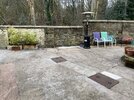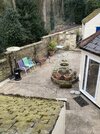


Our yard is something of the order 12x6m. It’s clearly been laid in multiple stages over the decades and been cut for access.
Individual slabs have small cracks and between sections the joins have become quite wide cracks.
We just had it properly cleaned and that seems a great time to address this, as it gets worse every winter.
I’m wondering if a better option than concrete is to use a special epoxy product? I do have some thoughts of painting it because it could be a nice space in summer.
Thoughts, tips, product suggestions all welcome

